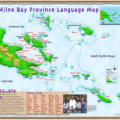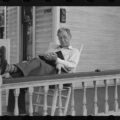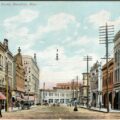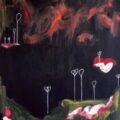Mapping Kei Miller’s Zion
 photo by Georgia Popplewell
photo by Georgia Popplewell
The British Isles are finally taking notice of the young Jamaican poet Kei Miller, whose third book of poems, The Cartographer Tries to Map a Way to Zion, reflects the writer’s own mapping of a rarely-charted course. The collection examines and records a poetic vision that began with his move from Jamaica to England and then Scotland, where he published two previous books of poetry, The Kingdom of Empty Bellies and There is an Anger that Moves. Miller’s verse production has been interspersed with fiction and a good deal of serious blogging before the appearance of Cartographer, which won this year’s Forward Prize and was shortlisted for the Costa Poetry Prize.

The Cartographer Tries to Map a Way to Zion
by Kei Miller
Softcover, $16.95
Carcanet Press, 2014
Miller stands as one of the few worthy inheritors of fellow Caribbean writer and Nobel Laureate Derek Walcott, whose work is steeped in the Anglo tradition but whose poetic landscape remains rooted in the island of St. Lucia. The Zion that Walcott might have imagined in his own “Season of Phantasmal Peace,” a place where birds “lifted together / the huge net of the shadows of this earth / in multitudinous dialects, twittering tongues, / stitching and crossing it”. This vision revisited in the language of Miller’s Cartographer, in which contemporary Jamaican and historical Elizabethan worlds meet through a lively, congenial conversation between a cartographer and a rastaman.
Tracing the thin line between exploration and exploitation, asking how porous is the border between two cultures, Miller suggests that Zion can be found in adopted or usurped surroundings as well as it can in one’s homeland. It’s as if one can store home “in the tank of somebody’s heart,” if one follows the intangible path, as he writes:
…You find your feet at last
straying off the marl roads, the bauxite roads, the slaving
roads and the marooning roads, and you would be
turning now onto the singing roads and the sweeting
roads that lift you up to such a place
as cannot be held on maps or charts, a place that does not
keep still at the end of paths. Know this,
that lions who trod don’t worry bout reaching Zion. In time
is Zion that reach to the lions.
This is the voice of an islander who has emigrated to another island. In Scotland, Miller is a citizen of one colonized nation living amongst another colonized people. He pursues the Jamaican dialect just as many Scottish poets have vividly recreated theirs, connecting his work to the legacy of the late Edwin Morgan, who translated so many “standard” English works into Scots. Miller exquisitely renders the dichotomy between cultures, and ideas of culture, in his poem “Unsettled”:
So consider an unsettled island.
Inside—the unflattened and unsugaredfields; inside—a tegaret
sprawl of roots and canopies,inside—the tall sentries of blood-
wood and yoke-wood and sweet-wood,of dog-wood, of bullet trees so hard
they will one day splinter cutlasses,will one day swing low the carcasses
of slaves; inside-a crawlingbrawl of vines, unseemly
flowers that blossom from their spines…
Juxtaposing “the carcasses of slaves” against the musical morass of “inside-a crawling / brawl of vines, unseemly / flowers that blossom from their spines” reveals a rasta Zion, a citadel of language and sound that lies between Edmund Spenser and Bob Marley. The descriptions of a yet-unmapped island in Cartographer offer a new perspective on what it means to originate in the Caribbean. His verse raises the dilemma of Derek Walcott’s “Schooner Flight”: “I have Dutch, nigger, and English in me, / and either I’m nobody or I’m a nation.” The beauty of a nation lies in the imagination of its people, as the beauty of a place is in the eye of the beholder. Miller ends “Unsettlement” with a return to the cartographer’s sentiment:
This is no paradise—
not yet—not this unfriendly, untamed island—this unsanitised, unstructured island—
this unmannered, unmeasured island;this island: unwritten, unsettled, unmapped.
These poems may not deal with race or imperialism overtly, but they present those ideas as inherent to Miller’s poetic imagination. They frame and reframe the island in its colonial negatives: its un–ness, its chaos, its indigenous beauty, its ageless rhythmic repetitions—“of blood- / wood and yoke-wood and sweet-wood, / of dog-wood, of bullet trees”. All are part of the landscape’s magnetism, integral to its seduction.
Though both poets excavate the idea of nationality in their poems, Miller diverges from Walcott in significant ways. Unlike his predecessor, who uses Caribbean dialects mostly in his plays or sparingly in poems, Miller embraces the Jamaican idiom. Where the sound of the English Renaissance predominates over the rhythms of St. Lucia in Walcott’s work, the influence of proper British tradition is less distinct in Cartographer. On balance, Miller favors the colloquial, the speech of the everyday, raising its pitch in his deft assemblage rather than reaching into the colonial past for higher tones. But the islander, and a true abiding love of the island, are important to both writers. Here again is Walcott’s “Schooner Flight”:
…I simply pile in
the back seat and watch the sky burn
above Laventille pink as the gown
in which the woman I left was sleeping,
and I look in the rearview and see a man
exactly like me, and the man was weeping
for the houses, the streets, that whole fucking island
Miller’s cartographer and rastaman aren’t weeping yet—though Miller hasn’t spent as much time away from Jamaica as Walcott had spent from St. Lucia. That said, despite how grounded his collection is in joy (particularly in the search for Zion as the book opens and ends) Miller’s coinage “heartbless” may have more than a touch of hiraeth to it—a Welsh word whose closest definition may be homesickness or nostalgia. The beautiful elegy, “My Mother’s Atlas of Dolls,” suggest the gulf between the cartographer and Zion is deeper and more painful than most of the poems indicate. “I think // of how we arrange the dead like dolls,” he writes:
[…] within their perfect boxes.
It may have been the dolls that taughtmy mother how to die, how to travel
once again, how to wave goodbye.
Miller’s work is less polarizing than that of some other poets of the late British empire. The voices of Irish poet Brendan Kennelly’s Buffún and Oliver Cromwell come to mind. Kennelly’s verse especially contains a deep and abiding anger against the English conquerors that’s wholly missing from Miller’s work. While he doesn’t avoid the issue of colonial legacy by any means, Miller approaches it more playfully—albeit with a sharp final message. He lets the story unfold in the place name poem, “Me-No-Sen-You-No-Come”:
In plain English: do not enter
without invitation. For consider the once-upon-a-time
adventures of rude pickney answering to name
Goldilocks—nuff-gyal, self-invited into house of bears,
assumed at once her colonial right to porridge, to beds
and to chairs. The baff-hand child went in just so, not
even a token of honey, and just like that
proceeded to bruck up things. If only she had pennied
the secret names of places. Me-no-sen-you-no-come:
without invitation, you’re not welcome. Or else, come
in as you please—just know that this ground, these
bushes, these trees observe you with suspicion many
centuries deep.
The patterns of a conquering people are presented here, from aggressive imperialist impulses to simple pleasure in discourse, even when that conversation derails the speaker’s purpose. Take this section from the much longer “x. in which the cartographer asks for directions,” which is about the simple desire to learn how to get somewhere:
…And beside her she always have two mongrel dog and
one of them is white and the nedda one is brown?Yes, I know exactly where you mean, the cartographer says.
And in the yard there is a big guinnep tree that hang
right out to the road, so school pickney always stop
there to buy shrimp and eat free guinnep?Yes, yes, the cartographer insists. I know it.
Good, says the I-formant. Cause you mustn’ go there.
In the outward spiral from the question of how to get to such-and-such a place, we hear a people, see a landscape, and sense a personality. Do we care which island the speaker is from? Not really. The vocabulary points toward Jamaica, but it’s the sense of a stranger in a strange land and the—intentional? unintentional?—joke played on the foreigner that’s important here.
Miller’s work is a striking addition to the literary conversation emanating from the West Indies and from other areas that once bore the Union Jack. His work moves without barbs, rooting itself in one of many languages alive in the United Kingdom. The underlying good natured tone of these poems only magnify their depth. Even at the end, with the rastaman gently disabusing the cartographer of the notion that he can plot a way to Zion, the speaker stands firm that it is a matter only Jah can decide—after “you trod the distance he set out for you to trod” and maintain “cleanness in your heart, only then, my bredda. Only then.”
About Valerie Duff
Valerie Duff-Strautmann’s poems have appeared in Ploughshares, Poetry Daily, The Common, and elsewhere; recent book reviews have appeared in the Boston Globe, PN Review, and Harvard Review. Her book, To the New World (Salmon Poetry), was shortlisted for the 2011 Seamus Heaney Centre Prize for Poetry. A recipient of grants and fellowships from the Massachusetts Cultural Council, St. Botolph Foundation, and VCCA, she is the poetry editor of Salamander Magazine and works as a freelance writer.





